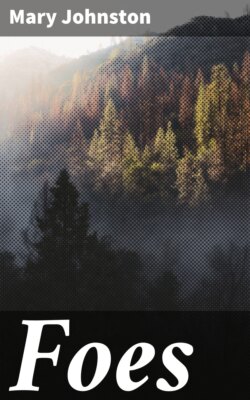Читать книгу Foes - Mary Johnston - Страница 11
На сайте Литреса книга снята с продажи.
CHAPTER IX
ОглавлениеTable of Contents
The month was May. The laird of Glenfernie, who had walked to the Kelpie's Pool, now came down the glen. Mother Binning was yet in her cot, though an older woman now and somewhat broken.
"Oh aye, my bonny man! All things die and all things live. To and fro gaes the shuttle!"
Glenfernie sat on the door-stone. She took all the news he could bring, and had her own questions to put.
"How's the house and all in it?"
"Well."
"Ye've got a bonny sister! Whom will she marry? There's Abercrombie and Fleming and Ferguson."
"I do not know. The one she likes the best."
"And when will ye be marrying yourself?"
"I am not going to marry, Mother. I would marry Wisdom, if I could!"
"Hoot! she stays single! Do ye love the hunt of Wisdom so?"
"Aye, I do. But it's a long, long chase—and to tell you the truth, at times I think she's just a wraith! And at times I am lazy and would just sit in the sun and be a fool."
"Like to-day?"
"Like to-day. And so," said Alexander, rising, "as I feel that way, I'll e'en be going on!"
"I'm thinking that maist of the wise have inner tokens by which they ken the fule. I was ne'er afraid of folly," said Mother Binning. "It's good growing stuff!"
Glenfernie laughed and left her and the drone of her wheel. A clucking hen and her brood, the cot and its ash-tree, sank from sight. A little longer and he reached the middle glen where the banks approached and the full stream rushed with a manifold sound. Here was the curtain of brier masking the cave that he had shared with Ian. He drew it aside and entered. So much smaller was the place than it had seemed in boyhood! Twice since they came to be men had he been here with Ian, and they had smiled over their cavern, but felt for it a tenderness. In a corner lay the fagots that, the last time, they had gathered with laughter and left here against outlaws' needs. Ian! He pictured Ian with his soldiers.
Outside the cavern, the air came about him like a cloud of fragrance. As he went down the glen, into its softer sweeps, this increased, as did the song of birds. The primrose was strewn about in disks of pale gold, the white thorn lifted great bouquets, the bluebell touched the heart. A lark sang in the sky, linnet and cuckoo at hand, in the wood at the top of the glen cooed the doves. The water rippled by the leaning birches, the wild bees went from flower to flower. The sky was all sapphire, the air a perfumed ocean. So beautiful rang the spring that it was like a bell in the heart, in the blood. The laird of Glenfernie, coming to a great natural chair of sun-warmed rock, sat down to listen. All was of a sweetness, poignant, intense. But in the very act of recognizing this, there came upon him an old mood of melancholy, an inner mist and chill, a gray languor and wanting. The very bourgeoning and blossoming about him seemed to draw light from him, not give light. "I brought the Kelpie's Pool back with me," he thought. He shut his eyes, leaning his head against the stone, at last with a sideward movement burying it in his folded arms. "More life—more! What was a great current goes sluggish and landbound. Where again is the open sea—the more—the boundless? Where again—where again?"
He sat for an hour by the wild, singing stream. It drenched him, the loved place and the sweet season, with its thousand store of beauties. Its infinite number of touches brought at last response. The vague crying and longing of nature hushed before a present lullaby. At last he rose and went on with the calling stream.
The narrow path, set about with living green, with the spangly flowers, and between the branches fragments of the blue lift as clear as glass, led down the glen, widening now to hill and dale. Softening and widening, the world laughed in May. The stream grew broad and tranquil, with grassy shores overhung by green boughs. Here and there the bank extended into the flood a little grassy cape edged with violets. Alexander, following the spiral of the path, came upon the view of such a spot as this. It lay just before him, a little below his road. The stream washed its fairy beach. From the new grass rose a blooming thorn-tree; beneath this knelt a girl and, resting upon her hands, looked at her face in the water.
The laird of Glenfernie stood still. A drooping birch hid him; his step had been upon moss and was not heard. The face and form upon the bank, the face in the water, showed no consciousness of any human neighbor. The face was that of a woman of perhaps twenty-four. The hair was brown, the eyes brown. The head was beautifully placed on a round, smooth throat. With a wide forehead, with great width between the eyes, the face tapered to a small round chin. The mouth and under the eyes smiled in a thousand different ways. The beauty that was there was subtle, not discoverable by every one.—The girl settled back upon the grass beneath the thorn-tree. She was very near Glenfernie; he could see the rise and fall of her bosom beneath her blue print gown. It was Elspeth Barrow—he knew her now, though he had not seen her for a long time. She sat still, her brown eyes raised to building birds in the thorn-tree. Then she began herself to sing, clear and sweet.
